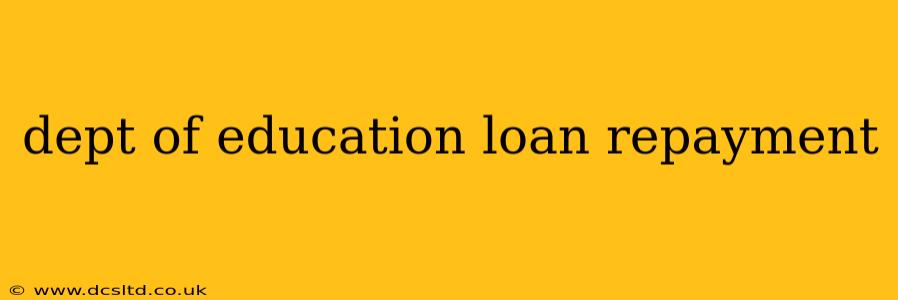Navigating the complexities of federal student loan repayment can feel overwhelming. This guide breaks down the various repayment plans offered by the Department of Education, helping you find the best option for your financial situation. We'll explore different plans, address common questions, and provide resources to make the process smoother.
What repayment plans are available through the Department of Education?
The Department of Education offers a range of repayment plans designed to cater to diverse financial circumstances. These include:
-
Standard Repayment Plan: This is the default plan, spreading your loan balance over 10 years with fixed monthly payments. It's straightforward but might lead to higher total interest payments compared to other plans.
-
Graduated Repayment Plan: Payments start low and gradually increase over the 10-year repayment period. This can be helpful initially, but payments become significantly higher in later years.
-
Extended Repayment Plan: This plan extends the repayment period beyond 10 years, lowering your monthly payments but increasing the total interest paid. Eligibility depends on your loan balance.
-
Income-Driven Repayment (IDR) Plans: These plans tie your monthly payments to your income and family size. There are several IDR plans, including:
- Income-Based Repayment (IBR): Based on your discretionary income and family size.
- Pay As You Earn (PAYE): Calculates payments based on 10% of your discretionary income.
- Revised Pay As You Earn (REPAYE): Similar to PAYE but includes both undergraduate and graduate loans.
- Income-Contingent Repayment (ICR): Considers your income, family size, and loan amount.
IDR plans typically offer lower monthly payments than other options. After a specific period (usually 20 or 25 years), any remaining loan balance may be forgiven, though this forgiveness is considered taxable income.
What are the benefits and drawbacks of each repayment plan?
The ideal repayment plan depends on your individual financial situation and long-term goals. Consider these factors:
-
Standard Repayment: Benefits include a predictable payment schedule and a shorter repayment period. Drawbacks include potentially high monthly payments and higher total interest paid.
-
Graduated Repayment: Benefits include lower initial payments. Drawbacks include significantly higher payments later on and a higher total interest paid.
-
Extended Repayment: Benefits include lower monthly payments. Drawbacks include a much longer repayment period and a substantially higher total interest paid.
-
IDR Plans: Benefits include significantly lower monthly payments based on income. Drawbacks include a longer repayment period and potential tax implications upon loan forgiveness.
How do I determine which repayment plan is best for me?
Choosing the right repayment plan requires careful consideration of your income, expenses, and long-term financial objectives. The Department of Education's website provides a repayment estimator tool that can help you compare different plans and estimate your monthly payments. You can also consult with a financial advisor to determine the best course of action.
What if I miss a payment?
Missing loan payments can lead to negative consequences, including late fees, damage to your credit score, and ultimately, default. If you're facing financial difficulties, contact your loan servicer immediately to discuss options like forbearance or deferment. These programs temporarily suspend or reduce your payments.
How can I consolidate my federal student loans?
Consolidating your loans combines multiple loans into a single loan with a new interest rate and repayment schedule. Consolidation can simplify repayment, but it might not always be the best option, depending on your interest rates and repayment plan.
What resources are available for help with student loan repayment?
The Department of Education's website is an invaluable resource, offering information on repayment plans, calculators, and contact information for loan servicers. You can also explore resources from non-profit organizations that provide financial counseling and guidance on student loan management.
Remember, proactive planning and careful consideration are crucial to effectively manage your student loan repayment. Don't hesitate to seek professional advice if needed. Your financial future is worth the effort.
